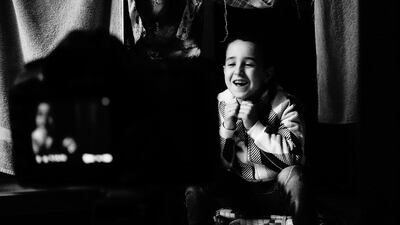A 6-year-old Syrian boy called Ahmad is the focus of Soudade Kaadan’s debut feature film, Obscure. The film will have its UK premiere at the Shubbak (which means window in Arabic) Festival in London, which starts on Saturday.
He lives in a Lebanese refugee camp and is so traumatised by his exile and sense of loss that he can barely speak. It takes hours of coaxing by his mother to wake him up each morning, and throughout the film he denies any knowledge of where he is from.
"Do I want to make a film about a kid who doesn’t speak at all?" – Kaadan says she asked herself this question during the early days of filming.
The filmmaker was born in France, but moved to Damascus at the age of 8, and lived there until she was driven out by the war in 2012. She felt unable to be creative for years when she began her film project, desperate to express her feelings about the destruction of Syria but feeling incapable of doing so.
"The situation was so cruel, I couldn’t make films any more," she says. "I didn’t want to make a piece of news [reporting] or political analysis. There’s so much information about Syria out there and no one cares."
Meeting Ahmad and seeing the "look in his eyes that you couldn’t forget" made her realise that this silence could be at the heart of her film.
Rather than trying to find a coherent shape to give her impressions of the conflict, she could admit the impossibility of doing so.
"I wanted to pass an emotional experience to the spectator – for the spectator to have more questions at the end of the film than answers," she says. "What can we do and how can we help these kids?"
Ahmad is not the only person in the documentary. There is also a more talkative Syrian girl, Batul, and a journalist who watches on a laptop images from the massacre in which his father died.
"He was talking about being numb," says Kaadan. "He says: ‘I don’t know, maybe I’m used to it – I don’t feel anything’."
As the film’s title suggests, it was the theme of obscurity that originally inspired Kaadan’s project. But as she researched, shot and edited the film over a five-year period, she realised that the work is "actually about trauma. We weren’t familiar with this concept in Syria before the war. Now, most of my generation has been through trauma".
She experimented with communicating this trauma through cinematic language, creating fragments of scenes, introducing repetition and posing questions without answers.
Sometimes the audio or visual track will fade out, replaced by field recordings, as though memories are penetrating the experience of reality.
Obscure has already been screened in Denmark and Switzerland. As it continues its tour of film festivals, Kaadan is already hard at work on her next project, a fictional drama called Daraa Is My Shadow, which she hopes to release next year. It is about a woman looking for gas for fuel during a cold Syrian winter, and realising that the people around her have lost their shadows. It is, then, another exploration of the experience of Syrians from an oblique angle – of a trauma, she says, that is not individual but collective.
"You see a whole generation change with one experience. It will never be the same," she says. "When the war finishes and we come back, how will we survive after this shock?"
That is not to say that healing is impossible. In Obscure, we see glimmers of that process as a social worker painstakingly coaxes Ahmad into playing with a xylophone.
Kaadan says it is possible to notice a change in Ahmad "from the beginning, where he’s absent, to the end, where he’s saying: ‘I want to stay here’. You can see it in the eyes".
• Obscure will screen on July 9 as part of Shubbak Festival, London’s largest biennial festival of contemporary Arab culture, which runs from Saturday until July 16
artslife@thenational.ae

